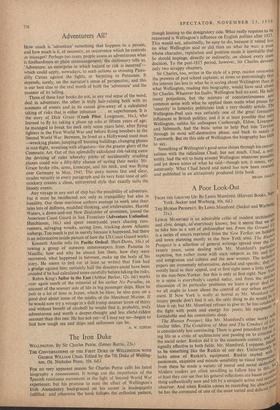Adventurers All?
How much is 'adventure' something that happens to a person, and how much is it, of necessity, an occurrence which he controls or manages? Perhaps too many people assess as adventurous what is foolhardiness or plain mismanagement; the dictionary tells us, 'Adventure: an enterprise in which hazard or risk is incurred'— which could apply, nowadays, to such actions as crossing Picca- dilly Circus against the lights, or bicycling to Penzance. It depends, surely, on the narrator's sense of perspective; and this is our best clue to the real worth of both the `adventure' and the manner of its telling.
Three of these four books do not, in any real sense of the word, deal in adventure; the other is truly hair-raising both' with its accounts of events and in its casual give-away of a calculated taking of risks that is either inhuman . . . or superhuman. It is the story of Dick Grace (Crash Pilot: Longmans, 16s.), who learned to fly by taking a plane up solo at fifteen years of age; he managed to break his neck only some years later, after flying fighters in the. First World War and before flying bombers in the Second World War. Between, he lived as a Hollywood: stunt man —wrecking planes, jumping off burning buildings, changing planes in mid-flight, wrestling with alligators—for the greater glory of the Cinematic Art. Out of this splendidly calculated risk-taking came the devising of rules whereby pilots of accidentally crashing planes could win a fifty-fifty chance of saving their necks. Mr. Grace broke ribs, arms, kneecaps, and his neck, and was flying over Germany in May, 1945. The story moves fast and clear, exudes veracity in every paragraph and its very faint tone of self- mockery creates a clean, extroverted style that exactly suits the bloody events.
Any voyage in any sort of ship has the possibility of adventure, but it must be recollected not only in tranquillity but also in humility. Our three maritime authors manage to work into their tales lots of dullness, muddled thinking, and irrelevancies. Harold Waters, a down-and-out New Zealander of seventeen, joined the American Coast Guard in San Francisco (Adventure Unlimited: Hutchinson, 16s.) and spent twenty odd. years chasing rum- runners, salvaging wrecks, saving lives, tracking down Atlantic icebergs. Too much is put in merely because it happened, but there is an informative inside picture of how the US Coast Guard works.
Kenneth Ainslie tells (in Pacific Ordeal: Hart-Davis, 16s.) .of towing a group of outworn minesweepers from Panama to Manilla; how and why he almost lost them, how they were recovered, what happened in between, make up the body of his story. He seems to feel (or at least so writes) that Fate had a grudge against him; certainly half the disasters could have been avoided if he had calculated more carefully before taking the risks.
Robin King's Sailor in the East (Arthur Barker, 12s. 6d.) works over again much of the material of his earlier No Paradise, an account of the seamier side of life in big passenger ships. Here he puts in a lot of time in Japan, which he likes; he also goes on a good deal about some of the misfits of the Merchant Marine. If he would now try a voyage in a dull tramp steamer (crew of thirty and without benefit of alcohol) he would find it, probably, truly adventurous and worth a deeper-thought and less cliché-ridden account than this one. He has not yet—if I may say so—begun to find how tough sea and ships and sailormen can be.
A. V. COTON










































































 Previous page
Previous page